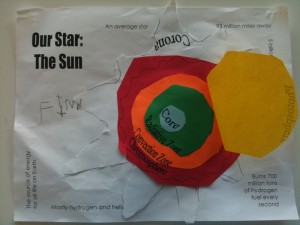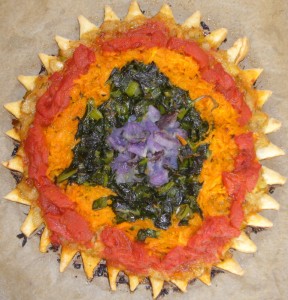by Lisa
Be warned: This is delicious, but not fast. It’s fun, but time consuming. It’s really pretty, but a major commitment of energy. Also, the kids might not eat it. Still.
A few weeks ago, Finn and I went to Chabot Space and Science Center for a kid’s science class about the sun. It was full of fun, hands-on projects, including something called a “Sunion”–a layered collage demonstrating the Sun’s layers. This was new information to him, and he took much care cutting and arranging the layers. When he proudly told his sister about it (“I made a Sunion!” ) she exclaimed, “A Sunion? What’s a Sunion? That sounds like a pie!” Which of course it does. It sounds like a pissaladiere–a really delicious, melt in your mouth savory French tart made with onions, garlic, anchovies, and black olives. So of course, yours truly followed through.
Together, we brainstormed what foods might make the various layers of the sun, and adapted the pissaladiere to Finn’s diagram. The result was really delicious, though Finn wouldn’t touch it, of course.
Here is Finn’s Sunion:
Yellow photosphere lifts to reveal: blue core, green radiative zone, orange convection zone, red chromosphere, white corona
Here is the one we ate:
The layers are composed of
- purple peruvian potatoes (boiled, cubed, tossed with butter)
- erbette chard sauteed in butter and olive oil with minced onion
- carrots sauteed in butter with thyme
- chopped plum tomatoes simmered with butter and thyme,
- all layered over a bottom layer of sliced yellow onions carmelized with 2-3 cloves garlic and 2 anchovies.
Once the vegetables are cooked, layer them over the uncooked pie crust according to your five-year old’s directions. Or you can improvise.
I would have added black olives for sun spots if I had any in the house. Also, I used a frozen TJ pie crust, which are terrific in a pinch. I rolled out the crust and cut the sun spokes with a paring knife, but you could obviously skip this and use a tart pan or even a plain old pie plate, or just free form it…
The hard part is that each layer needs to be cooked separately and drained so it doesn’t make the crust soggy. Once the tart is assembled, it goes in a hot (375 degree) oven until the crust is cooked. You can eat it immediately, or serve at room temperature. If you have the time and inclination, it would make a great side dish for company, a terrific plate on an al fresco buffet, a nice anchor for a picnic lunch…


